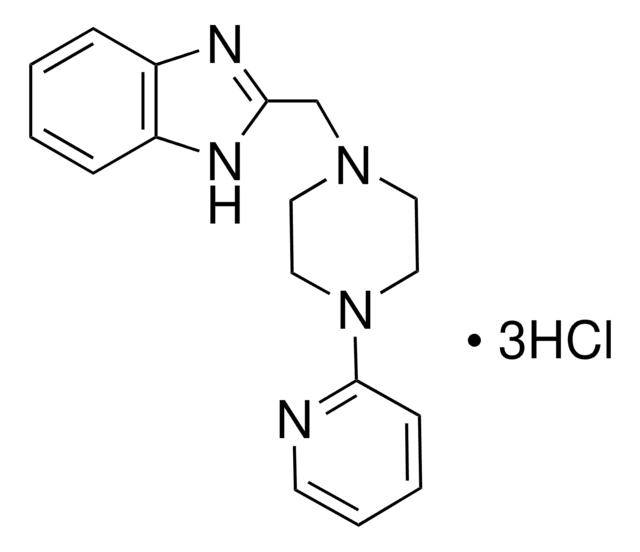추천 제품
애플리케이션
HydroMatrix has been shown to support improved growth and migration in the proliferation of many cell types, including neural stem cells, neurons, glia, astrocytes, fibroblasts, and keratinocytes.
성분
HydroMatrix is a peptide nanofiber 3-dimensional scaffold that promotes cell growth and migration. It utilizes specific peptides that self-assemble from fluid precursors into highly crosslinked peptide hydrogels when presented with increased temperatures or ionic strengths. By inducing a rapid transformation from solution to gel, a peptide nanofiber scaffold is generated. Adjusting the concentration of the HydroMatrix solution, researchers can control the flexibility of the 3-D architecture to meet their application′s specific needs.
주의사항
The lyophilized product at -20°C and is stable for many years at this temperature. The hydrogel should be stored at -70°C to maximize its active span. The 1% (w/v) stock solution should be stored -20°C and is stable for 3-6 months.
제조 메모
This product is supplied as a lyophilized powder. A 1% (w/v) stock solution at 10 mg/mL can be prepared with addition of sterile water, resulting in a rigid gel. A 0.5% (w/v) solution will lead to a softer gel that is more suitable for cell migration and angiogenesis. Lower concentrations in the range of 0.15%-0.25% are more suitable for many cell types including neurons. In aqueous solution, HydroMatrix has a pH of 2.5 and should not be added directly to cells without prior addition of a buffer or medium. Once the hydrogel has formed, do not attempt to mix the gel any further, as this risks destroying the hydrogel integrity. Manipulation of the cells should be carefully performed to avoid disruption of the scaffold.
법적 정보
Storage Class Code
11 - Combustible Solids
WGK
WGK 3
Flash Point (°F)
Not applicable
Flash Point (°C)
Not applicable
개인 보호 장비
Eyeshields, Gloves, type N95 (US)
시험 성적서(COA)
제품의 로트/배치 번호를 입력하여 시험 성적서(COA)을 검색하십시오. 로트 및 배치 번호는 제품 라벨에 있는 ‘로트’ 또는 ‘배치’라는 용어 뒤에서 찾을 수 있습니다.
Amish Asthana et al.
Drug discovery today, 17(15-16), 810-817 (2012-04-10)
The three microenvironmental factors that characterize 3D cultures include: first, chemical and/or biochemical composition, second, spatial and temporal dimensions, and third, force and/or substrate physical properties. Although these factors have been studied individually, their interdependence and synergistic interactions have not
Daniela Stoppoloni et al.
Rheumatology international, 33(9), 2399-2403 (2012-03-28)
Osteoarthritis (OA) is one of the most common degenerative joint disease for which there is no cure. It is treated mainly with non-steroidal anti-inflammatory drugs to control the symptoms and some supplements, such as glucosamine and chondroitin sulphate in order
Amish Asthana et al.
Drug discovery today, 18(11-12), 533-540 (2012-12-29)
Force and substrate physical property (pliability) is one of three well established microenvironmental factors (MEFs) that may contribute to the formation of physiologically more relevant constructs (or not) for cell-based high-throughput screening (HTS) in preclinical drug discovery. In 3D cultures
Josine E G Vaes et al.
Glia, 69(3), 655-680 (2020-10-13)
Encephalopathy of prematurity (EoP) is a common cause of long-term neurodevelopmental morbidity in extreme preterm infants. Diffuse white matter injury (dWMI) is currently the most commonly observed form of EoP. Impaired maturation of oligodendrocytes (OLs) is the main underlying pathophysiological
문서
3D cell culture overview. Learn about 2D vs 3D cell culture, advantages of 3D cell culture, and techniques available to develop 3D cell models
Hydrogela are the most widely used systems for 3D cell culture. Learn more about this technology (what are hydrogels? How to chose?)
자사의 과학자팀은 생명 과학, 재료 과학, 화학 합성, 크로마토그래피, 분석 및 기타 많은 영역을 포함한 모든 과학 분야에 경험이 있습니다..
고객지원팀으로 연락바랍니다.







